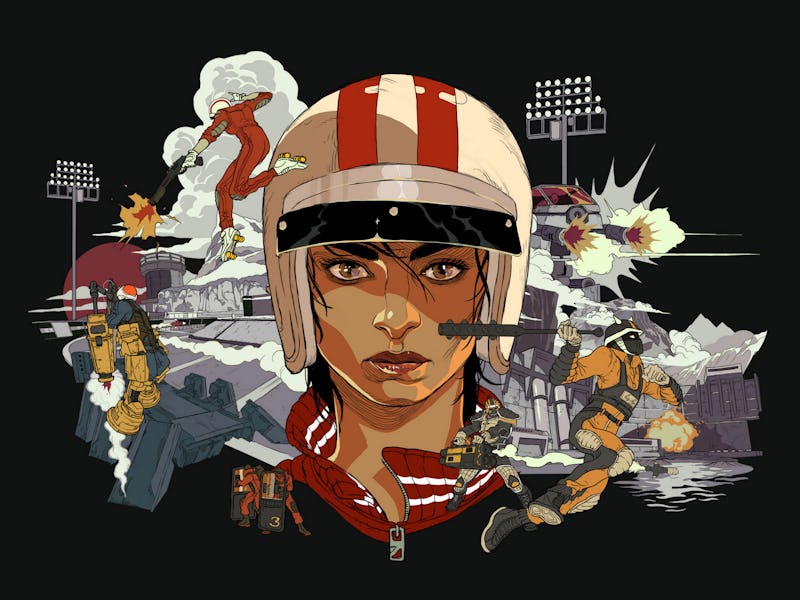If Rollerdrome’s Creators Aren’t Safe From Layoffs, No One in Gaming Is
No rhyme or reason.

Another day, another devastating games industry layoff. This time, the losses are centered on two studios under Grand Theft Auto publisher Take-Two’s Private Division label. Rollerdrome developer Roll7 and Kerbal Space Program 2 developer Intercept Games are reportedly being closed entirely, according to Bloomberg. The layoffs are part of a plan Take-Two announced last month to cut around 600 jobs total.
It can be tempting to look for patterns in the wave of gaming layoffs in the past few years. With Activision Blizzard, job cuts came after an acquisition that made some positions redundant. With countless indie studios, including the developer of last year’s brilliant Saltsea Chronicle, it was a chronic lack of funding for smaller games. But countless other eliminations and closures don’t fit any identifiable mold, Roll7 and Intercept now among them.
The publisher of Grand Theft Auto is closing two small studios to cut costs.
Take-Two confirmed to Inverse that the layoffs are part of its “cost reduction program” announced on April 16, and that Private Division will continue to update Kerbal Space Program 2.
In a February 2024 financial report, Take-Two showed a net revenue drop of three percent for the last quarter, bringing its earnings down to a measly $1.37 billion. The company expects to make $5.25 billion this year. Just a month ago, it spent $460 million to buy Gearbox Software from Embracer Group, celebrating its new acquisition with a round of cuts at the studio. The publisher also says it will spend up to $200 million on a cost-cutting plan, which includes losses from canceled projects and laid-off staff.
In other words, Take-Two has money to burn and is taking steps to further grow its massive profits, including eliminating jobs. As GamesIndustry.biz reported last year, Take-Two doubled CEO Strauss Zelnick and president Karl Slatoff’s compensation to a combined $72 million in 2023. With Grand Theft Auto 6 expected to launch next year, Take-Two also has as close as there is to a guaranteed hit on its hands soon.
So Take-Two isn’t hurting for cash, and the studios it cut weren’t exactly a drag on its multi-billion dollar operation. Both have their games published under the Private Division label, which supports small and mid-budget games at a significantly lower cost than Take-Two’s flagship titles. And at least in the case of Roll7, the studio was performing incredibly well.
There’s no justification for closing a studio this good.
Roll7’s two best-known games are OlliOlli and Rollerdrome, two of the most inventive sports games in years. OlliOlli and its sequels are skateboarding games focused on racking up huge combos with simplified control schemes, while Rollerdrome is a hybrid of trick-based skating and arena combat with a sick soundtrack and gorgeous cel-shaded visuals. Rollerdrome in particular has been something of a sensation since its 2022 release, earning glowing reviews, including multiple odes to its unique dynamics here at Inverse. Just last year, it won a BAFTA for Best British Game, which OlliOlli World was also nominated for.
And none of that matters. It’s been demonstrated time and time again that making successful games does nothing to insulate developers from layoffs. When PlayStation put 900 people out of a job earlier this year, some of the developers behind Marvel’s Spider-Man and The Last of Us were among them. In those cases, it’s possible that the skyrocketing cost of development is partially to blame. No matter how successful blockbuster games are, the publisher demand for multi-million dollar sales figures have led many studios to push for more features, better graphics, better marketing — and have no issue putting people out of work to pay for it.
That’s a hard case to make here. Rollderdrome was a huge success, and while we may not know exactly how much it cost to make, it’s likely a fraction of the budget for Take-Two’s larger titles. So we’re left again with the fact that good studios can be closed for no discernible reason other than funneling money to the top of their publishers’ org chart.
Kerbal Space Program 2 had a troubled launch, but that doesn’t make its creators expendable.
One message that it’s easy to take away from all this is that Roll7 is such a good studio, it doesn’t deserve this treatment, and to forget Intercept Games in the process. To be clear, Kerbal Space Program 2 launched to mostly negative reception, plagued with bugs and missing promised content. And Intercept Games doesn’t deserve this either.
Great studios like Roll7 shutting down demonstrates that quality won’t save anyone’s job, and the reverse is true, too — a bad game is no reason for people to lose their jobs. That’s especially true when the game is attached to one of the largest publishers in gaming, one that could shift a fraction of the amount it pays a single executive to hire dozens more developers.
It’s natural to look for the deeper reasons behind something as devastating as a mass layoff. Rising development costs are to blame, or the economy, or a game’s success, or any number of other causes. But with each inexplicable layoff and studio closure, there’s more evidence that the real cause is also the most boring — the games industry increasingly exists just to make a few people a lot of money, and developers themselves have to pay for it.